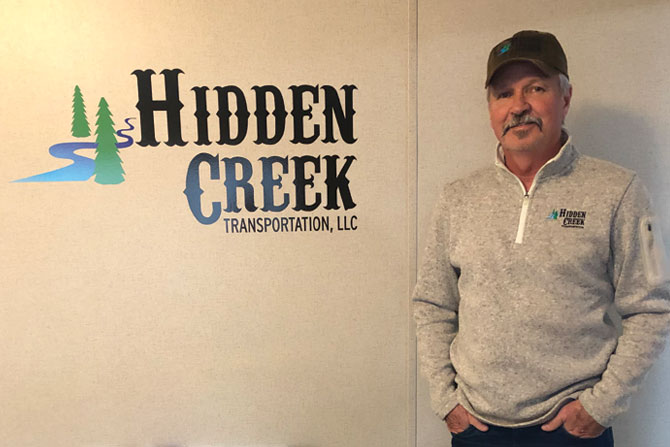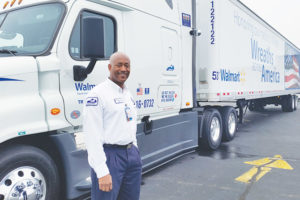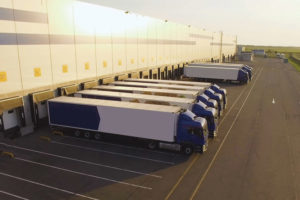By Kentucky Trucking Association

When Roger Waddle got into the trucking industry, his timing was good. Trucking had been a regulated industry since 1935, when trucking was first put under the control of the ICC. For decades, the trucking industry had been forced to deal with laws that made it harder to compete with the declining railroad industry and also made it hard for any new trucking companies to get into the business or even make major changes to their business. Carriers were exempt from antitrust laws, despite a veto from President Truman, from 1948 on. The result was an inefficient industry with shipping charges that were 75% higher than in countries that didn’t regulate the industry.
Much of that ended in 1980 with the Motor Carrier Act, which partially decontrolled trucking. Attitudes at the ICC were also more liberal than had been the case in the past. The result was greater efficiency, more competition and lower rates.
Roger was originally hired as a part-time mechanic for Super Service Transportation in 1980 by the company’s president, Harris (Happy) Rakestraw. The company grew during the 1980s and 1990s and was one of the top 100 trucking companies in the U.S. In 1999, when Happy was ready to retire, he asked Roger to take over his job. The company was running 800 trucks at the time.
At about the same time, Harvey Gainey at Gainey Transportation was buying trucking companies. Harvey bought Super Service. He also bought Lester Coggins Trucking. All three companies operated independently, which now had 2500 trucks on the road, and Roger stayed on as president.
Gainey Transportation filed for bankruptcy in 2008, and Wayzata Investments bought Super Service Transportation in 2009. Wayzata Investments consisted of some Harvard graduates with a $6 billion portfolio. Their interest was in generating money more than running the business, which was not good. Roger became the COO but left the company in 2013. His departure may have sped up the decline of Super Service, but he didn’t enjoy working for such a large company. He stayed out of the industry until his two-year noncompete clause had expired.
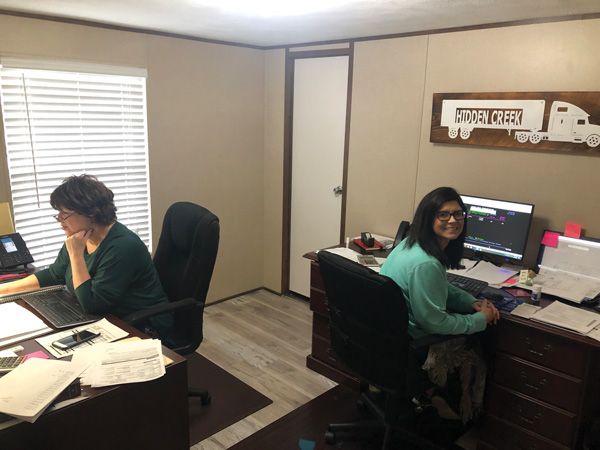
Roger had been working in the industry for more than 30 years by the time he left Super Service, and he could have happily retired, but he wanted to provide jobs for the people he’d worked with. Some of those relationships went back to his school days. For example, he was friends with two sisters who went to high school with him, Ruth Skaggs and Bobbie Hawk, and the three of them had worked together to build Super Service. He knew their jobs were falling apart along with the company he had left. In October 2015, he bought five trucks and started Hidden Creek Transportation. He named the company after the place where he currently lives.
J&R Shugel bought what little was left of Super Service toward the end of 2019.
Hidden Creek Transportation is intentionally much smaller than Super Service, but it is still growing quickly, and Roger enjoys coming to work every day.
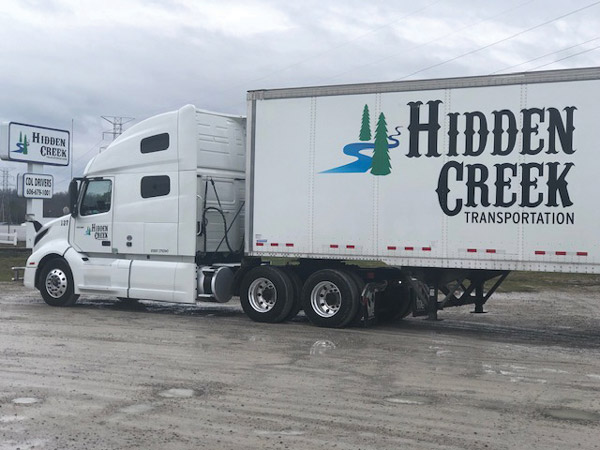
Roger Waddle Q & A
How did you become part of the trucking industry? Did you always aspire to be part of this industry?
When I graduated from high school, everyone was trying to get into the trucking business because of deregulation, so I thought that was the right thing to do. Happy Rakestraw hired me to work in an old barn on some old trucks. I was supposed to be part-time, but I worked 90 hours the first week. I told Happy not to make me a full-time employee.
After that, I worked my way up in the company. Happy decided to retire and he wanted me to take over. He told me that if I didn’t take the job, the company would bring in someone else. I didn’t want him to bring in someone else, so I finally accepted the job.
Describe your educational background.
My formal education stopped at high school. I worked in construction doing odds and ends and I worked on trucks. After that, my friends and I worked hard to build Super Service. It became a big, well-known company.
I never thought Super Service would be gone, but it is. However, I am still working together with my friends in the trucking industry. We’ve been blessed.
Are there any specific individuals who had a major impact on your career?
My mentors were Happy Rakestraw and Harvey Gainey. I learned hard work never killed anyone from Happy and I learned generosity goes a long way from Harvey. Both men are retired now, but I am still trucking.
What is the most rewarding part of your career?
The whole reason I started Hidden Creek Transportation was so I could create jobs for the people I worked with at Super Service. I am excited to go to work every day because of them.
- Bobbie Hawk is vice president of operations and Ruth Skaggs works part-time administration/finance. They are sisters. We went to high school together, but we never knew we would all work together to build two different trucking companies.
- Bruce Ellington is the first driver Super Service hired. I asked him if he wanted to come aboard Hidden Creek, and now he works in operations as a dispatcher.
- I’ve known VJ Begley since grade school. She is a dispatcher now, too.
- Our safety director is Jeff Knabusch. I’ve known him since the early days of Super Service in the 1980s.
- Bobbie’s daughter, Robin Burnett, works in operations for her mom.
- David Skaggs works part-time in billing. He was also a high school friend.
- We currently have 38 drivers. We treat them like family.
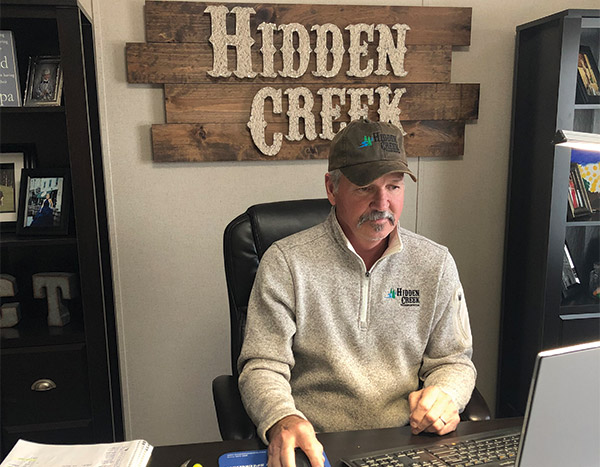
What do you think will be some of the dominant trends within the trucking industry in the next 5-10 years?
Long-haul trucking is a baby boomer business. It was a big thing in the 1980s, but it isn’t attractive now. In January 2020, long-haul trucking passed logging and fishing to become the most dangerous occupation in the U.S. It’s a hard, tough business. That’s why it won’t continue the way it is today.
Several large companies have gone bankrupt, and companies are buying other companies out. There are not enough drivers, and the driver shortage is not correcting itself. Nobody, especially millennials, wants to be away from home for long periods.
Companies like Amazon seem to want to be in the trucking industry, and they have the money to do that. But people don’t want to do long-haul trucking. Long-haul trucking has been going away over the last 20 years, and short-haul trucking has been increasing. Bigger trucks are coming off the road, and parcel trucking will continue to take its place. Somewhere in my lifetime, long-haul trucking will be replaced by driverless trucks. But there will always be the need for employees (as passengers) in these trucks.
What is the biggest impact of being a KTA member? What makes it beneficial?
There is always power in numbers, and the KTA has lots of shared knowledge. It’s a help that way. Starting a trucking company is a difficult thing to do. The people at the KTA answered many questions.
If you look back at your professional life, what would be three things that you have learned that you would pass onto a younger member looking at the trucking industry as a career?
- You have to be committed to your work. Trucking is not a 9-5 job; instead, it’s more like 24/7.
- You have to treat your drivers like part of the family. Know them, treat them well, and know their families. We don’t have a lot of turnover because we are good to our drivers.
- Trucking is a life choice. You have to love what you do to be in this business. It’s not a clock-in clock-out business. It’s a large industry, but it’s a small community. I know most of the people in it because of the work I’ve done for the last 40 years.
I have always been in the short-haul business, and that is the business we have today. If you limit distances to 500 miles, you have a smaller footprint and you can get drivers home on weekends. Our area is from the Midwest into the southeast.
Larger carriers expect drivers to be away from home for 14-17 days because they are out for the buck. It’s crazy, which is why those days are over. Their turnover is 120% because drivers want to be home every night. That’s not possible, but the weekends are.
What are some professional moments that make you the proudest?
My proudest moment was becoming the owner of Hidden Creek. I worked hard to get here. Now I am the president of Hidden Creek, and I get to make the decisions. I no longer answer to a board of directors.
This story appears in the 2020 Issue 2 Kentucky Trucker Magazine.

